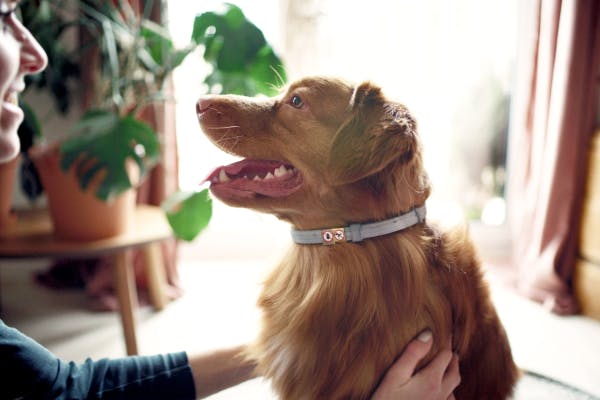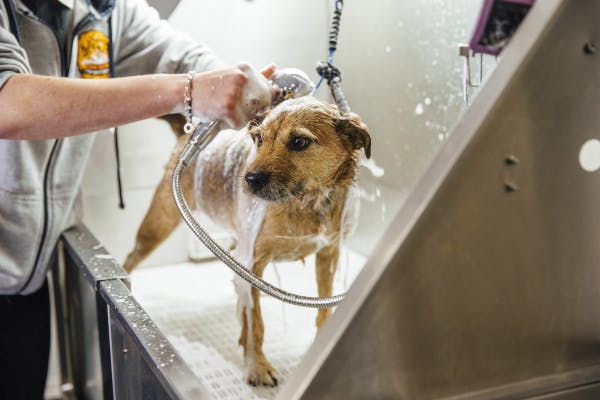learn about dental dog treats
Unlock Your Dog's Dental Health: Top Tips for Choosing and Using Dental Chews
Learn about choosing and using dental chews to maintain your dog's oral hygiene. Dental chews can reduce plaque and tartar buildup, freshen breath, and provide mental stimulation. Select the right dental chew based on size, ingredients, texture, flavor, safety, and chewing habits.

Dental health is essential for a dog's overall well-being, and dental chews can play a significant role in maintaining oral hygiene. These chews can help reduce plaque and tartar buildup, freshen breath, and provide mental stimulation for your furry friend. When used alongside regular dental care routines, dental chews can be a valuable addition to keeping your dog's teeth and gums healthy.
- The Importance of Dental Health in Dogs
- Benefits of Dental Chews for Dogs
- Choosing the Right Dental Chew for Your Dog
- How Often to Give Your Dog Dental Chews
- Safe Ingredients in Dental Chews and Treats
- Alternative Methods for Maintaining Your Dog's Dental Health
- Establishing a Healthy Dental Routine for Your Dog
The Importance of Dental Health in Dogs
Dental health is crucial for a dog's overall well-being. Like humans, dogs can suffer from gum disease, which can lead to loss of appetite, broken or lost teeth, and even damage to other organs if bacteria enter the bloodstream through unhealthy gums. Professional cleanings and brushing a dog's teeth are effective ways to maintain their oral health. Dog dental treats and special diets may also help, but use them with caution.
Dog dental treats can improve teeth and gum health by reducing plaque build-up. Chewing helps remove plaque, and some dog dental treats and diets can reduce plaque by nearly 70%. The act of chewing itself can significantly impact maintaining healthy teeth. For example, one study found that making kibble 50% bigger led to a 42% reduction in tartar. Adding polyphosphate to the products reduced tartar by 55%.
The Veterinary Oral Health Council (VOHC) evaluates pet products to determine if they meet standards for reducing plaque or tartar. Approved foods, treats, and chews must reduce plaque or tartar by at least 10% to receive the VOHC seal of approval. If a chemical anti-plaque agent is used, it needs to reduce plaque or tartar by at least 20%.
Dog dental treats can also help with bad breath in dogs. Bacteria build-up in the mouth often causes bad breath, indicating the dog needs better dental or gum care. In addition to professional cleaning and regular tooth brushing, some dog treats are designed to help improve breath. Hard chew toys may also help improve a dog's breath.
Benefits of Dental Chews for Dogs
Dental chews for dogs offer many benefits that contribute to their overall health and well-being. These chews can enhance dental health by reducing plaque and tartar buildup while freshening breath, providing mental stimulation, and offering safe alternatives for chewing items that could be harmful. When used alongside regular dental care routines, dental chews can be a valuable addition to maintaining a dog's oral hygiene.
One significant benefit of dental chews is their ability to improve dental health by reducing plaque and tartar buildup on a dog's teeth. Chewing on these treats can help scrape away debris and bacteria that accumulate in a dog's mouth. Some dental chews have a special texture that helps remove plaque more effectively, while others contain ingredients that help break down tartar.
Another benefit of dental chews is their ability to freshen a dog's breath. Bad breath in dogs is often caused by bacteria buildup in the mouth. By removing some of this bacteria through chewing, odors associated with it can be reduced. Dental chews with added breath fresheners can further help combat bad breath.
Chewing is not only beneficial for a dog's dental health but also provides mental stimulation. The act of chewing requires focus and concentration, helping keep their mind active and engaged. This mental workout can be especially helpful for dogs prone to boredom or anxiety, offering them positive ways to expend energy.
Dental chews provide safe options for dogs who love chewing things around the house without causing damage or harm, allowing them to satisfy their need to chew safely.
best dental dog treats
- our rating98 out of 100
- our rating98 out of 100
- our rating97 out of 100
Choosing the Right Dental Chew for Your Dog
Selecting the right dental chew for a dog is crucial for maintaining healthy and clean teeth. Dental chews help prevent plaque and tartar buildup, freshen breath, and provide mental stimulation. Consider these factors when finding the best dental chew for a dog:
Size: Choose one that fits the dog's size to prevent choking and ensure effective teeth cleaning. Dental chews come in various sizes, so select one suitable for the dog's weight and breed.
Ingredients: Opt for chews with natural ingredients, free of grains or gluten, which are ideal for dogs with allergies or sensitivities. It's also beneficial to find dental chews containing vitamins and minerals to promote overall canine health.
Texture: Chews featuring ridges, grooves, or unique shapes are more effective than smooth ones. Select a dental chew that will clean a dog's teeth efficiently without causing discomfort.
Flavor: Dogs are more likely to use a dental chew frequently if they enjoy the flavor. Popular options include mint, chicken, beef, and vegetables.
Safety: Look for chews tested by organizations like the Veterinary Oral Health Council (VOHC) to ensure their effectiveness at reducing plaque and tartar buildup.
Chewing habits: Observe how a dog chews and choose a dental chew they will enjoy while providing optimal benefit.
How Often to Give Your Dog Dental Chews
Incorporating a dental chew into a canine oral care routine helps maintain a healthy mouth. The frequency of giving dogs dental chews may vary depending on factors such as size, age, general health status, or specific needs; however daily use is usually recommended.
Puppies' chewing habits may differ from adult dogs due to developing teeth while older dogs might not chew as much due to age-related factors. Be sure to read the dental chew package and follow the manufacturer's guidelines, which are often verified by the Veterinary Oral Health Council for proper use.
The frequency of giving a dog a dental chew may also depend on the type of chew used. Some chews are single-use, while others last longer. Additionally, different chews contain various ingredients and features that affect how often they should be given.
Providing dogs with a dental chew daily can help maintain clean teeth and contribute to overall health. Always consult a veterinarian before trying new dental chews or changing usage frequency.
Safe Ingredients in Dental Chews and Treats
Dental chews and treats with safe ingredients are vital for a dog's health and well-being. These products help maintain oral hygiene by preventing plaque and tartar buildup while improving breath odor.
Natural ingredients: Sweet potatoes, carrots, peas, and apples make good choices for dental chews because they are healthy, easy to digest, and less likely to cause allergies in dogs.
High-quality protein sources: Opt for chicken, beef or fish instead of low-quality protein sources like meat by-products or unspecified meat meals.
Added vitamins and minerals: Seek out chews containing vitamin C, vitamin E, calcium phosphorus along with other essential nutrients.
Enzymes: Enzymatic dental chews contain enzymes that break down plaque and tartar on a dog's teeth.
Prebiotics: Prebiotics aid digestion by promoting beneficial bacteria growth in a dog's gut; Inulin is a common prebiotic ingredient found in dental chews.
When choosing a dental chew or treat, avoid artificial flavors, colors, and preservatives; select those containing natural flavorings such as mint or parsley since these can freshen breath without harming canine health.
Safe ingredients in dental chews and treats play an essential role in maintaining oral hygiene while minimizing allergies or adverse reactions. Consult a veterinarian if there are concerns about the dental chews or treats to give a pet.
Alternative Methods for Maintaining Your Dog's Dental Health
Maintaining your dog's dental health is crucial, and there are several alternatives to traditional dental chews. Some of these options include dental toys, water additives, dog toothpaste and toothbrushes, and specific dog foods.
Dental toys, such as rubber chew toys or rope toys, can clean your dog's teeth by scraping off plaque and tartar while they chew. These durable toys provide lots of fun for your dog while keeping their teeth clean.
Water additives can improve your dog's oral health. By adding these products to their water, you can kill bacteria in their mouth, reducing bad breath and preventing plaque and tartar buildup. Some water additives even contain enzymes that break down plaque and tartar for extra protection.
Using dog toothpaste and toothbrushes is another way to ensure a clean mouth for your pet. Choose a toothpaste with enzymes that break down plaque and use a soft-bristled toothbrush designed for dogs. Regularly brushing your dog's teeth with these items can prevent issues like gingivitis or gum disease.
Certain types of dog food also promote better oral health. Special dental diets help reduce the amount of plaque and tartar on your dog's teeth by encouraging more chewing due to larger kibble size. Some dental diets also contain ingredients like polyphosphates that slow down tartar buildup.
It is important to take care of your dog’s mouth for their overall health. While many people use dental chews, exploring other options allows you to find the best method for keeping your pet’s teeth clean and healthy. Always consult with a veterinarian before starting any new dental care products or routines for your pet.
Establishing a Healthy Dental Routine for Your Dog
A healthy mouth is essential for dogs' overall well-being; relying solely on dental chews isn't enough. A comprehensive dental care routine should include regular tooth brushing, professional cleanings, and monitoring signs of potential dental issues.
Brushing your dog's teeth is the most effective way to prevent plaque and tartar buildup. Ideally, brush your dog's teeth daily using a toothbrush and toothpaste specifically designed for dogs. If daily brushing isn't possible, aim for several times per week. Most dogs will eventually become accustomed to having their teeth brushed with patience and time.
Professional dental cleanings play a crucial role in maintaining your dog's oral health. Veterinarians recommend annual cleanings which include an exam, scaling, polishing, and sometimes X-rays to evaluate the teeth and gums' condition. Anesthesia is used during the cleaning process to ensure your pet's comfort.
Dog owners should be vigilant for signs of dental problems in their pets like bad breath, difficulty eating, bleeding gums or irritability. If you notice changes in your dog’s behavior or suspect they are experiencing pain from oral issues, consult with a vet immediately.
Routine veterinary check-ups can help identify any dental problems early on; therefore they can be treated before worsening complications arise. Discuss any concerns or questions about dental care with your veterinarian who will provide advice on how best to maintain good oral health for your pet.
Feeding dry food may contribute to keeping a clean mouth as well since some brands offer specialized dental diets that limit plaque and tartar buildup on the teeth due to larger kibble size or specific ingredients that slow down tartar formation.
Dental toys also contribute towards maintaining good oral hygiene as they remove plaque and tartar while being chewed by the dog; ensure these toys are safe and appropriate for the size of the animal along with its chewing habits.
Incorporating these steps into your dog's routine care plan will significantly improve both their short-term and long-term overall well-being: regularly brush their teeth, schedule professional cleanings annually at minimum, monitor signs of potential issues, feed them dry food formulated specifically for optimal oral health, and provide safe dental toys.








